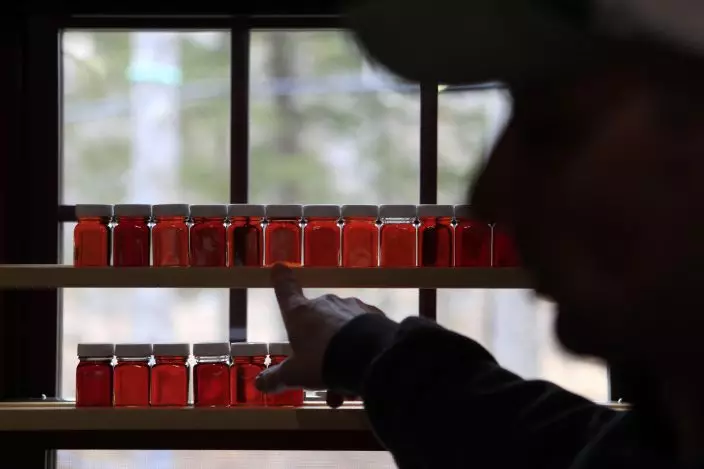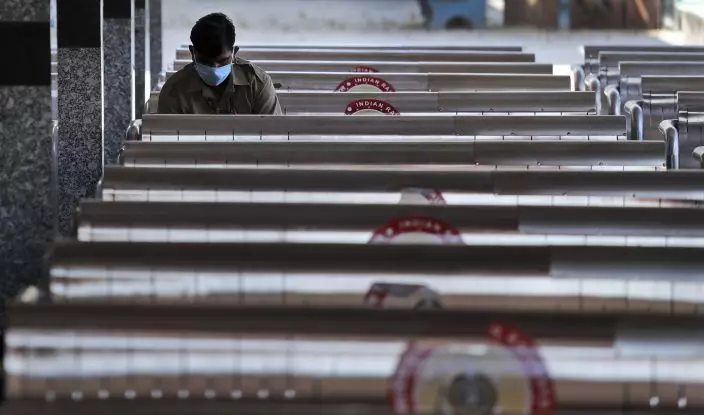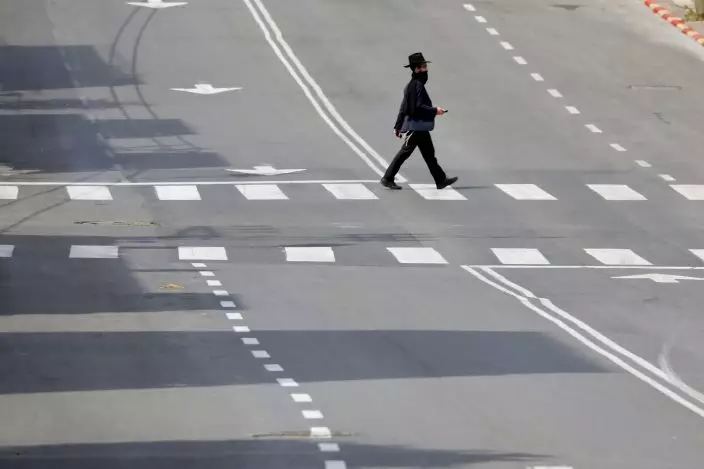The outbreak of the coronavirus has dealt a shock to the global economy with unprecedented speed. Following are developments on Thursday related to the global economy, the work place and the spread of the virus.
ZOOM: At the end of last year, the video-conferencing company Zoom had about 10 million daily users. By March, that number was 200 million. This week, CEO Eric Yuan is addressing some of the security concerns that have arisen as tens of millions of uses fled offices and logged in to Zoom chats.
"For the past several weeks, supporting this influx of users has been a tremendous undertaking and our sole focus," Yuan wrote in a blog post. “However, we recognize that we have fallen short of the community's -- and our own -- privacy and security expectations. For that, I am deeply sorry.”

In this Wednesday, April 1, 2020 photo, Scott Dunn shows a visitor the different grades of maple syrup produced this season at the Dunn Family Maple sugar house in Buxton, Maine. Maple syrup producers are dealing with several setbacks after the coronavirus outbreak including the recent cancelation of Maple Syrup Sunday. (AP PhotoRobert F. Bukaty)
The company is enacting a 90-day freeze on new features so that it can deal with concerns about privacy on the platform. It's also bringing in third-party expertise to assess how it's handling user security.
Among the issues disrupting users is “zoombombing," when people who are not part of a group break into a Zoom meeting to post images or memes.
SEEKING SHELTER: Businesses are being devastated by the outbreak, especially those that were already struggling. The number seeking bankruptcy protection is growing.

A railway employee sits in the corner of a deserted railway station during a 21 day lockdown to control the spread of coronavirus in New Delhi, India, Thursday, April 2, 2020. The new coronavirus causes mild or moderate symptoms for most people, but for some, especially older adults and people with existing health problems, it can cause more severe illness or death. (AP PhotoManish Swarup)
Dean & Deluca, a delicatessen founded in the 1970s in New York’s SoHo neighborhood, has become the latest, filing for Chapter 11 protection bankruptcy in a U.S. court.
The chain, which was acquired by Pace Development in Bangkok about six years ago, had been closing stores in recent months to revitalize the brand.
ARMY OF UNEMPLOYED: Estimates for the first waves of job losses in the U.S. related to the outbreak have been all over the map. The actual number blew all of those estimates away Thursday. The Department of Labor reported more than 6.6 million Americans applied for unemployment benefits last week, far exceeding a record high set just last week

An Ultra orthodox man cross a main deserted street because of the government's measures to help stop the spread of the coronavirus in the orthodox city of Bnei Brak, a Tel Aviv suburb, Israel, Thursday, April 2, 2020. On Wednesday, Netanyahu ordered a police cordon around the largely ultra-Orthodox city of Bnei Brak, east of Tel Aviv, to limit movement to and from the city. Bnei Brak has the second highest number of coronavirus cases in Israel. (AP PhotoAriel Schalit)
Nearly 900,000 workers have lost their jobs in Spain since being ordered to stay home, authorities said Thursday. The short-term job loss was higher than in January 2009, when 350,000 workers lost their jobs during the global financial crisis.
The European Commission has designed a new program to raise up to 100 billion euros in loans to tackle the unemployment induced by the virus outbreak and weather the impact of the economic crisis looming.
TRAVEL: One thing largely unnoticed with millions of people shut in is the lack of planes in the sky. The travel industry appeared to come to a standstill last week, but the number of those taking flights is actually still falling to new lows.
The Transportation Security Administration said it screened 146,348 people on Tuesday, nearly 8,000 fewer than Monday and down 93% from one year ago.
Korean Air on Thursday pleaded for swift government intervention Thursday.
The airline, South Korea's largest, recently sent all of its 387 foreign pilots on unpaid leave for three months and says it could possibly ask its entire workforce of 20,000 to take temporary leaves if conditions deteriorate further.
MARKETS: The staggering U.S. job report knocked the wind out of an early rally on Wall Street.
The Dow, S&P 500 and Nasdaq all essentially went flat at the opening bell.
RAILWAY RIGATONI: Whether or not pasta is considered critical, a steady supply is being ensured by German supermarket chain Aldi through the use of special trains.
The company said Thursday that shipments by rail have so far brought more than 200 metric tons of fusilli, penne and spaghetti across the Alps to satisfy surging demand in Germany.
Aldi worked with logistics company DB Schenker to haul the pasta by truck from Naples to northern Italy, where the goods were then loaded onto trains to Nuremberg.


